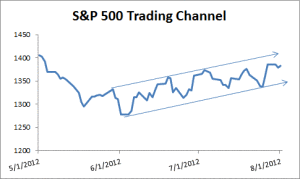Politics made the front pages again, but Isaac got moved back. “Romney Vows to Deliver the Country from Economic Travails” and “A Suitor Makes the Case for Divorce” in the New York Times (NYT) and “Romney Vows to ‘Restore’ US” and “After the Celebrating, the Race Moves to Battleground States” in the Wall Street Journal (WSJ) pretty much sum up the political news, while “Storm Weakens But Still is Wreaking Havoc in the South,” (NYT, p. A20) and “Reckoning With Isaac” (WSJ, p. A3) are pretty self-explanatory. The Financial Times (FT) passed on Isaac completely but did have political analysis on page 2, with “Health insurance scheme for elderly rises to top of agenda” and “Parties prepare for tightest of votes in Florida’s bellwether area.” You can see the transition from the convention coverage to the race coverage, from hype to real analysis. Should be a very interesting fall. Once again, I recommend Nate Silver at the NYT as an excellent political analyst.
Europe is the other major meta-story. The deadline is coming near for many European issues, with “Judgment Days Arrive for Euro Crisis” in the WSJ (p. A16) and “Eurozone banks facing sweeping regulation” in the FT (p. 1). In the next two weeks, we have several critical events scheduled in Europe. On September 6, the European Central Bank meets and is widely expected to announce a bond-buying program to support the government bond markets; on September 9, Greece presents its latest attempt at budget cuts; and on September 12, Germany’s constitutional court rules on the legality of the bailout fund and Dutch elections take place, which will probably result in a change of government. I have no doubt I will be hitting all of these issues here in the blog, probably at length.






